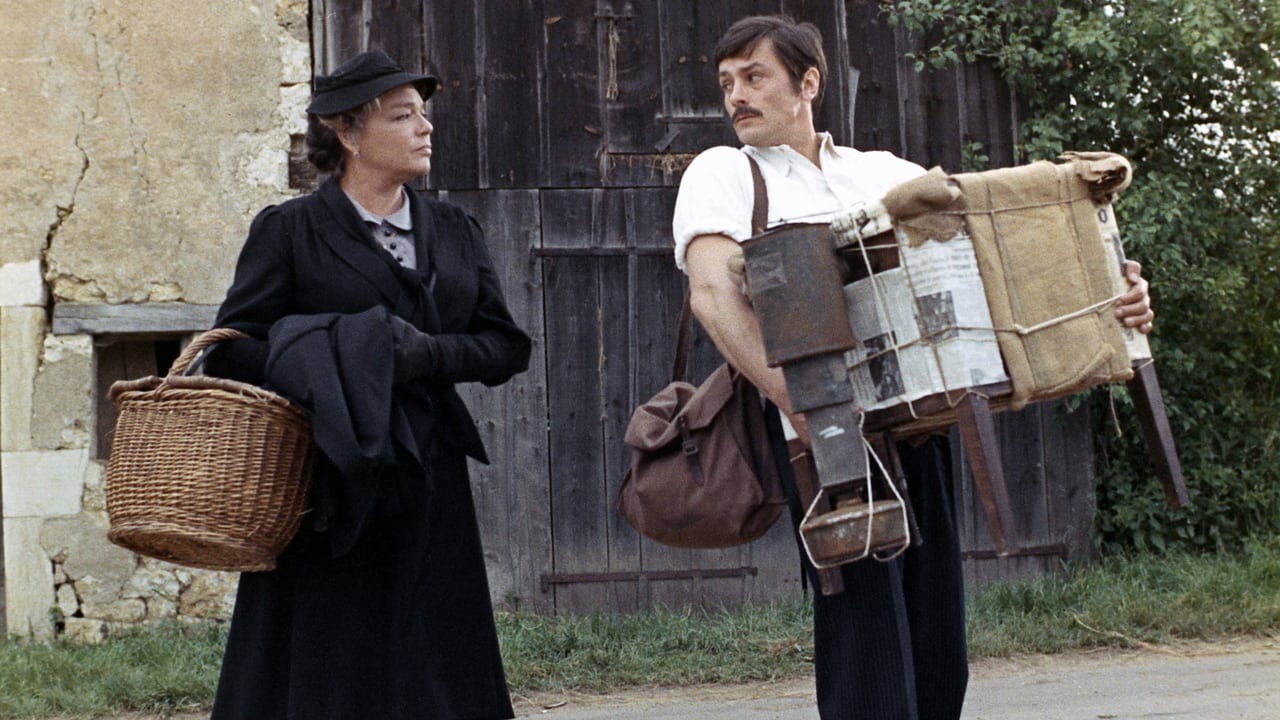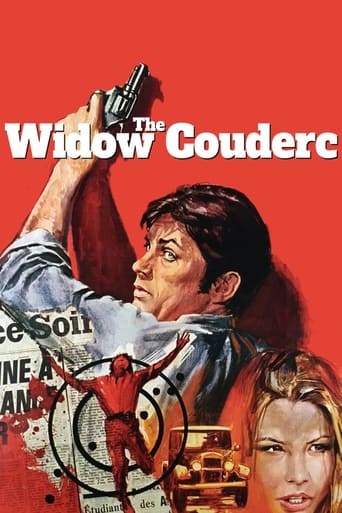Incannerax
What a waste of my time!!!
SmugKitZine
Tied for the best movie I have ever seen
Arianna Moses
Let me be very fair here, this is not the best movie in my opinion. But, this movie is fun, it has purpose and is very enjoyable to watch.
Fleur
Actress is magnificent and exudes a hypnotic screen presence in this affecting drama.
blanche-2
"The Widow Couderc" from 1971 is a moody, atmospheric piece set in the French countryside post-World War I, starring Alain Delon and Simone Signoret. An odd coupling considering Delon starred with so many va-va-va boom types. Nevertheless, their teaming works well.It is directed by Pierre Granier-Deferre. Based on a novel by George Simenon, Signoret is the widow Tati, who runs the family farm. Her father-in-law lives with her. Across the way are her sister-in-law and husband, who hate her and would do anything to get the farm away from her. Living with them is their daughter Felicie, a young girl with an illegitimate baby.One day a handsome stranger arrives in the area, and the widow hires him to do some work on a temporary basis. It's not long before they become lovers. Little does she know he is an escaped prisoner, Jean Lavigne. Jean notices the nubile Felicie, which makes the widow jealous. Jean and Felicie eventually become lovers as well.However, anxious to get the farm, the widow's family wants anything on him that they can get, and encourage the father-in-law to talk and Felicie to snoop around.This is a tragic story with a vivid look at both farm and village life, and we can see the life of the widow, which is all farm work, and the flippant youth dancing in the village. One gets the impression that her life has been nothing like this as married due to pregnancy, the baby died, and apparently she was raped by her father-in-law, who during the film tries to get into her room when she goes to bed. It also appears that sometimes she lets him in, which is indicative of her loneliness. The village women don't seem to know or want to know her, and when Jean moves in, there is a lot of gossip.What sets this film apart is the detail of the farm work and life in the village and the spare dialogue. I can't see the pace of this going over well with American audiences. The build up is slow; the final scenes are devastating.Signoret is excellent as a vulnerable woman with a tough exterior, protecting her farm as well as herself. Delon is wonderful as a quiet man who inveigles himself into the life of Signoret. I was so happy when he shaved the mustache. When he goes to the village dance, all spiffed up with no mustache, wearing a suit jacket, and with his hair slicked back, he looks like an Italian Vogue model. There is certainly something about the way he smokes a cigarette and tosses it away - he indeed is the essence of smooth and cool.The end has something written about Jean Lavigne that is so convoluted - I would love to know what it actually said.Highly recommended. Someone said the companion film on the Delon disc, Diabolically Yours, is better. Can't agree. This film is superior.
writers_reign
This is a mood piece verging on Checkov-lite that lays out its effects like pieces of a jig-saw puzzle - the floor-standing clock prodigal with precious time, the scything, the hewing, the raising and lowering of the bridge, the local bus - and then assembles them meticulously and lovingly into a time-capsule of rural France. In the early seventies the writer director enjoyed a good run including a remarkable trio of consecutive splendour via La Horse, Le Chat and this one. Signoret and Delon represent not only different generations but different acting styles and what could have been a car crash of epic proportions is instead a bittersweet blend of heady wine that leaves a pleasant aftertaste. We have, of course, been here before - Goupi Mains rouge set the bar back in the days of the Occupation - but then we've been everywhere, Man, cinematically speaking and just because I've spent one April in Paris doesn't mean I'm replete and have no eyes to return. This is an exceptional film and almost fit to be mentioned in the same breath as Le Grand Chemin it certainly belongs in any self-respecting collection of French movies.
raymond-106
Being a tutor in French I found this film now almost 40 years old fresh and appealing.The director's hand is evident in every little detail. Two bickering families living on opposite sides of a canal with a drawbridge that had to be raised with every passing barge created the unpleasant atmosphere of harsh words and bitter remarks. It's a wonderful setting of simple pleasures like scything the grass and feeding the hens and chopping the wood and filling the lamps with kerosene. Simone Signoret as the bitter widow Couderc who claimed she had to do all the work around the place was most convincing in her role as she went about her daily chores. Even her walk to the bus showed a certain animosity. She was indeed an unhappy creature yearning for love.How fortunate for her that Jean a handsome prison escapee(Alain Delon) happens along to lend a hand in running the farm and eventually comforts her in her bed. Jean proves to be a real handy man when he sets up an egg incubator to provide lots of chickens in the future. The incubator plays a pivotal role in the whole story. It can be said that the story began with the incubator and ended with the most tragic consequences.As much as I loved the story the overwhelming quality of this film was the sight and sounds of the village atmosphere and how well the actors melted into the daily living. I have never lived in a French village but what I observed in this film seemed pretty authentic to me.The plot takes a nasty turn when Jean's presence is reported to the police by a couple of the spiteful villagers. Excitement takes over as the chase to capture him runs to a thrilling climax. I did wonder though why so many police were involved in his capture. A little bit over the top, methinks, but great for a dramatic finish.
dbdumonteil
At the time ,French cinema was updating the rural thriller ,a genre which had begun in the late thirties/forties with such works as "Goupi Mains Rouges" "l'Assassinat du Père Noël" or "la Ferme aux Loups".The early seventies began with Granier-Deferre's "La Horse " (Gabin) and continued with another Granier-Deferre (this one) as well as with "L'Affaire Dominici" (Gabin) and "Les GRanges Brulées" (Signoret and Delon teaming up again).These movies from the seventies were more realistic ,more "precise in their depictions of rural life than those released earlier."La Veuve Couderc",like one of his precedent movies ("Le Chat" also feat Signoret) was first a novel by Georges Simenon.In France ,people were amazed to see Delon playing opposite Signoret ,but most of the actresses Delon played with in the seventies ,with the exception of Romy Schneider or Jeanne Moreau,were starlets.There was really a special chemistry between them which was not as effective in their later effort "les Granges Brûlées" .Both are well cast,Signoret as a strong middle -age peasant woman and Delon as the fugitive .Granier-Deferre helped pave a way to a new "Cinema de Qualité" which made us forget the pretensions of the new wavelet.

